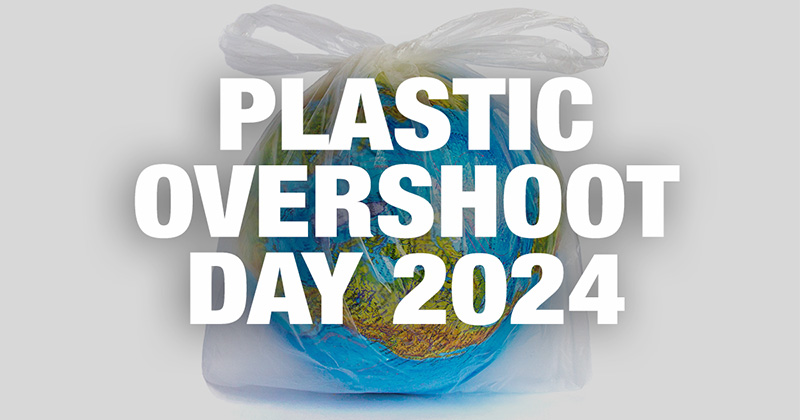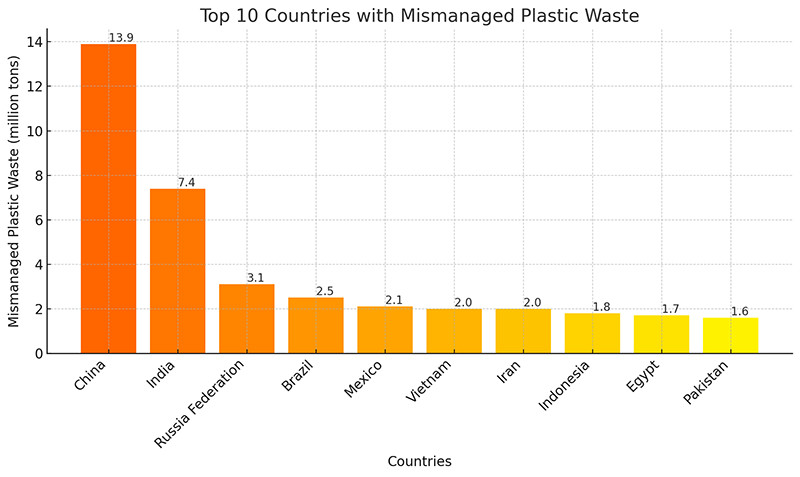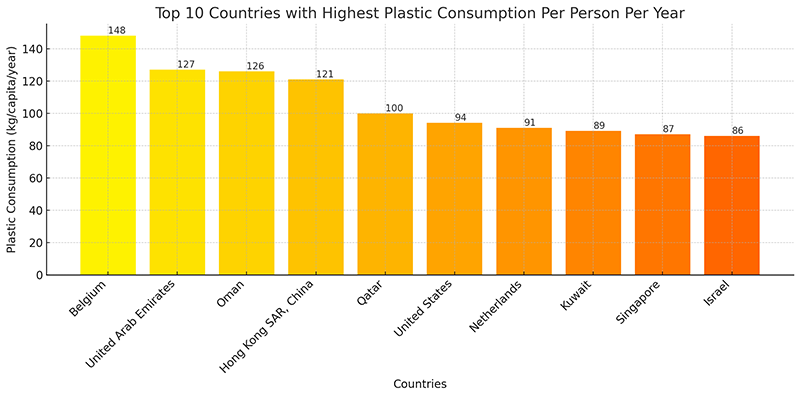Plastic Overshoot Day 2024

Every day, we encounter plastic. It's in our homes, our workplaces, and even our pockets. It's so pervasive that we often overlook just how much of it we produce and use. But have you ever stopped to think about where all this plastic ends up? This is where Plastic Overshoot Day (POD) comes into play.
POD marks a significant point in the year: the day when we've generated more plastic waste than our planet can manage, leading to environmental pollution. A sobering reminder of the impacts our daily habits can have on the world around us.
Plastic Overshoot Day Date
According to the 2024 report by Earth Action, this year, the global community hit Plastic Overshoot Day on 5th September. Yes, you read that right - by there-quarters of the way through the year, we will have surpassed our planet's annual capacity to handle plastic waste.
But what does this really mean? And why should we care? Let's dive into the world of plastic waste and uncover the importance of Plastic Overshoot Day.
Mountains of Plastic!

Plastic is truly everywhere. From our weekly food shop to the packaging of our online purchases, it's an integral part of our daily lives. The convenience and versatility of plastic has made it a go-to material for numerous applications, but at what cost?
The amount of plastic we produce is staggering. Imagine for a moment that every single person on Earth is responsible for 28 kg plastic each year. Now multiply that by the global population. That's a lot of plastic, isn't it? Over 220 million tonnes globally consumed in fact. And here's the kicker: experts predict that we're set to double this amount in the coming years. This isn't just a mountain of plastic; it's an entire mountain range!
But where does all this plastic go? It doesn't just disappear after we've finished with it. And that's where we encounter a significant problem. Our current global waste management systems simply aren't equipped to handle this vast amount of plastic waste. What's worse, a considerable portion of this plastic ends up in our environment, causing pollution and harming wildlife.
This escalation of plastic production and waste is precisely what drives the significance of Plastic Overshoot Day.
Plastic's Journey from Your Bin to the Environment

Ever wondered what happens to your plastic waste after you toss it in the bin? It's easy to think 'out of sight, out of mind,' but the journey of plastic waste doesn't end at your kerbside.
In an ideal world, all of our plastic waste would be collected, recycled, or properly disposed of. However, the reality is quite different. The truth is our current waste management systems are struggling to keep up with the sheer volume of plastic waste we generate.
Firstly, not all plastic can be recycled. Some types are simply not recyclable with current technologies. Even the plastic that is recyclable often doesn't make it to recycling facilities due to contamination or improper sorting.
Secondly, the capacity of landfills is finite. With the amount of plastic waste we generate, we are quickly running out of space. But landfilling isn't a sustainable solution anyway: it locks valuable resources into the ground and can lead to harmful leachates polluting our soil and water.
So, what happens when our waste management systems can't cope? The overflow ends up in our environment. It litters our streets, clogs our waterways, and pollutes our oceans. Globally, millions of tonnes of plastic waste end up in the environment each year, causing significant harm to wildlife and ecosystems.
This is the harsh reality that Plastic Overshoot Day brings to light. The day when our plastic waste generation exceeds our waste management capacity, leading to inevitable environmental pollution.
The Turning Point: Plastic Overshoot Day
Now that we've painted a picture of the issue at hand, let's delve into the specifics of Plastic Overshoot Day (POD).
POD is a stark reminder of the environmental cost of our plastic consumption. It marks the day in the year when we've generated more plastic waste than our planet can manage. In other words, from this day onwards, every piece of plastic waste we create contributes directly to environmental pollution.
In 2023, the global community reached Plastic Overshoot Day on the 4th September. That means we had already generated more plastic waste than our current waste management systems can manage for the entire year.
For us in the UK, our Plastic Overshoot Day is estimated to occur on 8th December 2024, due to our ability to better manage, sort, and recycle our plastic waste compared to the global average. It's a testament to the progress we've made, but also a reminder of the work still ahead as 245,140 tons of plastic is expected to be mismanaged within the UK.
For more in-depth information about Plastic Overshoot Day and the methodology behind it, you can refer to Earth Action's comprehensive 2024 report. The report sheds light on the magnitude of the problem and highlights the urgent need for change.
Plastic in Numbers
The global impact of plastic waste is staggering, with some countries contributing more significantly than others. As we delve into the data, we'll explore the top nations in terms of mismanaged plastic waste and individual plastic consumption per year (kg / capita / year).
The Top 10 Countries with Mismanaged Plastic Waste per Year

- China – 13.9 million tons
- India – 7.4 million tons
- Russia Federation – 3.1 million tons
- Brazil – 2.5 million tons
- Mexico – 2.1 million tons
- Vietnam – 2 million tons
- Iran – 2 million tons
- Indonesia – 1.8 million tons
- Egypt – 1.7 million tons
- Pakistan – 1.6 million tons
Top 10 Countries with Highest Plastic Consumption per Person per Year (kg / capita / year)

- Belgium - 148 kg / capita / year
- United Arab Emirates - 127 kg / capita / year
- Oman - 126 kg / capita / year
- Hong Kong SAR, China - 121 kg / capita / year
- Qatar - 100 kg / capita / year
- United States - 94 kg / capita / year
- The Netherlands – 91 kg / capita / year
- Kuwait - 89 kg / capita / year
- Singapore - 87 kg / capita / year
- Israel - 86 kg / capita / year
When it comes to the global issue of plastic waste, the numbers reveal a fascinating story. China tops the list with a staggering 13.9 million tons of mismanaged plastic waste each year, followed by India at 7.4 million tons.
While these numbers are immense, it's interesting to note that when we shift our focus to plastic consumption per person, neither China nor India make the top ten. Instead, Belgium takes the crown, with each resident consuming an average of 148 kg of plastic annually, closely trailed by the United Arab Emirates and Oman.
These figures highlight the complexities and disparities in how different nations produce, consume, and manage plastic, emphasising the need for global solutions and cooperation.
Why Should We Care?

Plastic pollution isn't just an eyesore. It's a profound issue that impacts our world in ways you might not expect. From the smallest organisms to the largest ecosystems, no part of our natural world is untouched by the effects of plastic waste.
One of the most visible impacts of plastic pollution is its harm to wildlife. Every year, countless birds, marine animals, and other creatures suffer and often die due to plastic waste. They can mistake plastic items for food, leading to ingestion and often fatal consequences. Others become entangled in discarded plastic products, which can cause severe injuries and impede their ability to move or eat.
Beyond its effects on wildlife, plastic pollution also contributes to the degradation of our natural environments. Our beautiful beaches, once pristine, are now often littered with plastic debris. Our oceans, home to diverse marine life, are turning into plastic soup. Our soil, too, is not immune. Microplastics – tiny particles of broken-down plastic – are finding their way into our soil, with effects on soil health that we're only beginning to understand.
But it's not just about nature. Plastic pollution affects us, humans, too. The plastic we discard doesn't disappear; it breaks down into microplastics, which can end up in our food and water supplies. The health implications of this are still not fully understood, but the idea of consuming plastic is far from appetising.
In short, plastic pollution is a complex problem with environmental, wildlife, and potentially human health implications. Understanding and acting upon Plastic Overshoot Day is a crucial step towards mitigating these impacts.
We Can Make a Difference!

As overwhelming as the problem may seem, there is hope. Each of us can play a role in addressing plastic pollution and mitigating its impacts on our planet.
An essential step in combating plastic pollution is reducing our plastic waste. While this may seem daunting at first, there are actually many simple and practical ways to reduce your plastic waste in daily life. Our team at HIPPO has put together a comprehensive guide on this very topic. Check out our blog post on how to reduce your plastic waste to get started.
Moreover, our efforts don't stop at individual actions. We need system-wide changes to make a significant impact. This includes improving our waste management systems, developing better recycling technologies, and advocating for policies that reduce plastic production at the source. Thankfully governments are starting to pay attention to this urgent issue, and England fell in-line with the rest of the UK as it banned single use plastics from 1st October 2023.
By taking these steps, we can help push back Plastic Overshoot Day and ensure a healthier planet for future generations.

